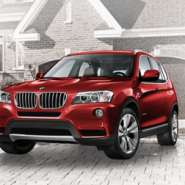 Automakers such as BMW, Audi and Lexus have three of the four top Facebook IQs based on innovative tabs, personalization and engagement, according to a study from L2 Think Tank.
Automaker Ferrari tied with apparel and accessories designer Tory Burch to round off the top 10. Other luxury brands granted the first 20 “genius” and “gifted” statuses were Lancome, Swarovski, Hugo Boss, Mercedes-Benz and Nars.
“The biggest differentiation from brands at the top and at the bottom is the sizable communities with a lot of engagement,” said Maureen Mullen, director of research and advisory services at L2 Think Tank, New York.
“The conversation around Facebook is shifting from amassing fans and likes to moving toward how you are going to activate the community,” she said. “A two-way communication is much different from traditional broadcast such as print, and as Facebook is moving out of its infancy and into its teenage years, brands are changing in how they are interacting with consumers.
“Brands that are successful are going to be able to tweak marketing messages to nuances on the Facebook platform in terms of dialogue, sharing and the authenticity of the platform.”
The data comprising the L2 Think Tank Prestige Facebook IQ study was collected from March 2011 through the middle of May.
Ultimate engaging machine
The brand with the No. 1 IQ was BMW.
Automakers such as BMW, Audi and Lexus have three of the four top Facebook IQs based on innovative tabs, personalization and engagement, according to a study from L2 Think Tank.
Automaker Ferrari tied with apparel and accessories designer Tory Burch to round off the top 10. Other luxury brands granted the first 20 “genius” and “gifted” statuses were Lancome, Swarovski, Hugo Boss, Mercedes-Benz and Nars.
“The biggest differentiation from brands at the top and at the bottom is the sizable communities with a lot of engagement,” said Maureen Mullen, director of research and advisory services at L2 Think Tank, New York.
“The conversation around Facebook is shifting from amassing fans and likes to moving toward how you are going to activate the community,” she said. “A two-way communication is much different from traditional broadcast such as print, and as Facebook is moving out of its infancy and into its teenage years, brands are changing in how they are interacting with consumers.
“Brands that are successful are going to be able to tweak marketing messages to nuances on the Facebook platform in terms of dialogue, sharing and the authenticity of the platform.”
The data comprising the L2 Think Tank Prestige Facebook IQ study was collected from March 2011 through the middle of May.
Ultimate engaging machine
The brand with the No. 1 IQ was BMW.
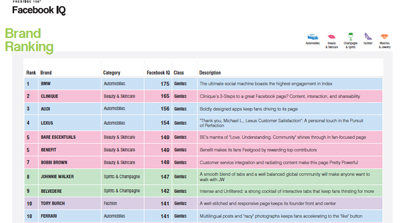 The top 10 brands
One of the main things that put the automaker at the top of the list was that it had the second-highest interaction rate in auto.
Every time the brand posts on its Facebook wall, approximately 25 percent of its community responds, per Ms. Mullen.
The top 10 brands
One of the main things that put the automaker at the top of the list was that it had the second-highest interaction rate in auto.
Every time the brand posts on its Facebook wall, approximately 25 percent of its community responds, per Ms. Mullen.
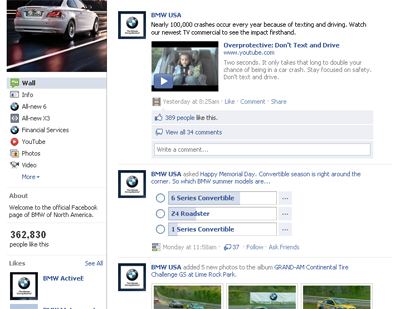 Tons of user interaction on the BMW Facebook page
L2 also commended Lexus and Audi for their impressive customer service via the social network and boldly designed and interesting apps, respectively.
Tons of user interaction on the BMW Facebook page
L2 also commended Lexus and Audi for their impressive customer service via the social network and boldly designed and interesting apps, respectively.
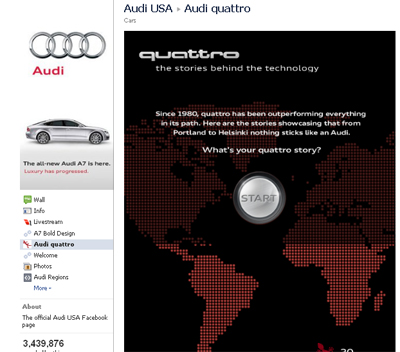 Audi's Facebook tabs
Tory Burch was the only fashion brand to break into the top 10.
The brand’s incorporation of other social media channels, including YouTube and the founder’s blog, was a main factor that contributed to Tory Burch’s genius status.
Furthermore, the young brand held up surprisingly well – i.e. better than – traditional luxury brands such as Gucci and Burberry.
“Gucci, Burberry and Chanel receive a lot of accolades for their Facebook pages, but haven’t really opened up and started treating it like social media, more like broadcast media where they only allow one-way dialogue,” Ms. Mullen said. “They don’t allow consumers to upload and, as a consequence, it seems that a smaller percentage is responding.”
Tory Burch does not have as many fans as Burberry, but allows its customers to post on its wall and regularly responds to contributions.
Audi's Facebook tabs
Tory Burch was the only fashion brand to break into the top 10.
The brand’s incorporation of other social media channels, including YouTube and the founder’s blog, was a main factor that contributed to Tory Burch’s genius status.
Furthermore, the young brand held up surprisingly well – i.e. better than – traditional luxury brands such as Gucci and Burberry.
“Gucci, Burberry and Chanel receive a lot of accolades for their Facebook pages, but haven’t really opened up and started treating it like social media, more like broadcast media where they only allow one-way dialogue,” Ms. Mullen said. “They don’t allow consumers to upload and, as a consequence, it seems that a smaller percentage is responding.”
Tory Burch does not have as many fans as Burberry, but allows its customers to post on its wall and regularly responds to contributions.
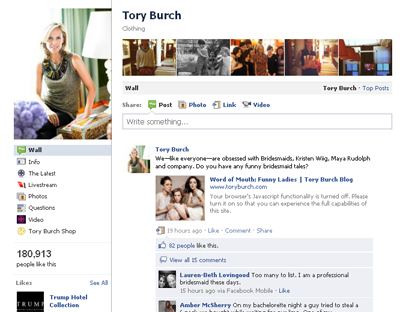 Tory Burch's Facebook
Other brands that should receive honorable mentions, but could stand to step-up their Facebook game, are Marc Jacobs, Estee Lauder, Cadillac, Omega, Hennessey, Ralph Lauren, Diane von Furstenberg and IWC.
Need more polish
There are a few luxury brands such as Prada, Patek Philippe, De Beers and Dom Perignon that could use some tips from their higher-scoring competitors.
Facebook is still considered new media, and even though some luxury brands have decided to stick with more traditional marketing strategies such as print and out of home, the social networks’ power is undeniable.
Prada, Balenciaga, Dom Perignon and Patek Philippe do not have Facebook pages that are powered by the brands.
Rather, consumers started them and have been working toward building conversations without the help of the brand.
However, there are definitely ways to integrate old and new media.
“Facebook is not overpowering old media but becoming a really important part of the media mix,” Ms. Mullen said. “What we’ve seen is that the most powerful new media campaigns integrate old media.”
For instance, cosmetics brands sometimes run television commercials that link to a brand’s Facebook page at the end.
Also, automakers will include a QR code or other mobile call-to-action in a print ad.
“The medium of choice has been print in the past and I don’t think that print is going away, but when you look at the global circulation of some print magazines where ads are running such as Vogue or Vanity Fair as compared to the Facebook fans, you begin to see a shift of power,” Ms. Mullen said. “But, brands need to start getting smart and recognizing the need to connect directly with customer.
“Brands shouldn’t just be pushing out a message like in print but rather engaging in a two-way dialogue and having one-on-one conversations with customers,” she said.
Please click here to download L2 Think Tank's Facebook IQ study.
Final Take
Rachel Lamb, editorial assistant on Luxury Daily, New York
Tory Burch's Facebook
Other brands that should receive honorable mentions, but could stand to step-up their Facebook game, are Marc Jacobs, Estee Lauder, Cadillac, Omega, Hennessey, Ralph Lauren, Diane von Furstenberg and IWC.
Need more polish
There are a few luxury brands such as Prada, Patek Philippe, De Beers and Dom Perignon that could use some tips from their higher-scoring competitors.
Facebook is still considered new media, and even though some luxury brands have decided to stick with more traditional marketing strategies such as print and out of home, the social networks’ power is undeniable.
Prada, Balenciaga, Dom Perignon and Patek Philippe do not have Facebook pages that are powered by the brands.
Rather, consumers started them and have been working toward building conversations without the help of the brand.
However, there are definitely ways to integrate old and new media.
“Facebook is not overpowering old media but becoming a really important part of the media mix,” Ms. Mullen said. “What we’ve seen is that the most powerful new media campaigns integrate old media.”
For instance, cosmetics brands sometimes run television commercials that link to a brand’s Facebook page at the end.
Also, automakers will include a QR code or other mobile call-to-action in a print ad.
“The medium of choice has been print in the past and I don’t think that print is going away, but when you look at the global circulation of some print magazines where ads are running such as Vogue or Vanity Fair as compared to the Facebook fans, you begin to see a shift of power,” Ms. Mullen said. “But, brands need to start getting smart and recognizing the need to connect directly with customer.
“Brands shouldn’t just be pushing out a message like in print but rather engaging in a two-way dialogue and having one-on-one conversations with customers,” she said.
Please click here to download L2 Think Tank's Facebook IQ study.
Final Take
Rachel Lamb, editorial assistant on Luxury Daily, New York
